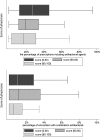The impact of physicians' knowledge on outpatient antibiotic use: Evidence from China's county hospitals
- PMID: 32011504
- PMCID: PMC7220442
- DOI: 10.1097/MD.0000000000018852
The impact of physicians' knowledge on outpatient antibiotic use: Evidence from China's county hospitals
Abstract
We designed this study to explore how factors, especially knowledge, influence the use and prescriptions of antibiotics among physicians in China's county hospitals.A questionnaire was designed to evaluate the knowledge levels of physicians. The rates of antibiotic prescriptions were collected through on-the-spot investigations. The percentage of encounters with antibiotics prescribed and the percentage of encounters with antibiotics combination prescribed were used to measure antibiotics use. Univariate analysis and the generalized linear model were applied to analyze the knowledge levels among physicians as well as their antibiotic prescriptions.A total of 334 physicians in 60 county hospitals filled out the questionnaires, and 385,529 prescriptions were collected. The mean score of the questionnaire was a pass (62.8). The physicians in the eastern region of China demonstrated higher levels of knowledge than other regions (P = .08). Physicians with a higher score prescribed less antibiotics (P < .01) and less antibiotics combination (P = .07).The knowledge gap of Chinese physicians is evident and those with a higher degree of knowledge always prescribe fewer antibiotics. Targeted training and courses to educate physicians about the risks of over-prescription of antibiotics should be conducted to improve the practice of antibiotic prescriptions.
Conflict of interest statement
The authors have no conflicts of interests to disclose.
Figures
Similar articles
-
Effect of physicians' knowledge on antibiotics rational use in China's county hospitals.Soc Sci Med. 2019 Mar;224:149-155. doi: 10.1016/j.socscimed.2019.01.049. Epub 2019 Jan 30. Soc Sci Med. 2019. PMID: 30784853
-
Antibiotic prescribing for upper respiratory infections among children in rural China: a cross-sectional study of outpatient prescriptions.Glob Health Action. 2017;10(1):1287334. doi: 10.1080/16549716.2017.1287334. Glob Health Action. 2017. PMID: 28462635 Free PMC article.
-
Overuse of antibiotics for the common cold - attitudes and behaviors among doctors in rural areas of Shandong Province, China.BMC Pharmacol Toxicol. 2015 Mar 31;16:6. doi: 10.1186/s40360-015-0009-x. BMC Pharmacol Toxicol. 2015. PMID: 25884702 Free PMC article.
-
Prescription antibiotics for outpatients in Bangladesh: a cross-sectional health survey conducted in three cities.Ann Clin Microbiol Antimicrob. 2014 Apr 22;13:15. doi: 10.1186/1476-0711-13-15. Ann Clin Microbiol Antimicrob. 2014. PMID: 24755269 Free PMC article.
-
[Antibiotic therapy in Bielefeld (AnTiB)-a local project for the promotion of rational antibiotic prescribing in the outpatient pediatric sector].Bundesgesundheitsblatt Gesundheitsforschung Gesundheitsschutz. 2019 Aug;62(8):952-959. doi: 10.1007/s00103-019-02978-y. Bundesgesundheitsblatt Gesundheitsforschung Gesundheitsschutz. 2019. PMID: 31209503 Review. German.
Cited by
-
Knowledge, attitude, and practice of antibiotics use among primary healthcare physicians, Ministry of Health, Jeddah.J Family Med Prim Care. 2022 Aug;11(8):4382-4388. doi: 10.4103/jfmpc.jfmpc_60_22. Epub 2022 Aug 30. J Family Med Prim Care. 2022. PMID: 36352954 Free PMC article.
-
Prescribers' Knowledge, Attitudes and Behaviors on Antibiotics, Antibiotic Use and Antibiotic Resistance in Jordan.Antibiotics (Basel). 2021 Jul 15;10(7):858. doi: 10.3390/antibiotics10070858. Antibiotics (Basel). 2021. PMID: 34356779 Free PMC article.
-
Antibiotic prescription practices and knowledge of its rational use among medical personnel in areas of Vidarbha: Are we equipped enough for rational use of medicines?J Family Med Prim Care. 2025 Mar;14(3):1091-1097. doi: 10.4103/jfmpc.jfmpc_1418_24. Epub 2025 Mar 25. J Family Med Prim Care. 2025. PMID: 40256064 Free PMC article.
-
Outpatient Antibiotic Prescribing Patterns in Children among Primary Healthcare Institutions in China: A Nationwide Retrospective Study, 2017-2019.Antibiotics (Basel). 2024 Jan 10;13(1):70. doi: 10.3390/antibiotics13010070. Antibiotics (Basel). 2024. PMID: 38247629 Free PMC article.
-
Outpatient prescribing pattern for acute bronchitis in primary healthcare settings in China.NPJ Prim Care Respir Med. 2021 May 10;31(1):24. doi: 10.1038/s41533-021-00234-y. NPJ Prim Care Respir Med. 2021. PMID: 33972552 Free PMC article.
References
-
- Meyer E, Gastmeier P, Deja M, et al. Antibiotic consumption and resistance: data from Europe and Germany. Int J Med Microbiol 2013;303:388–95. - PubMed
-
- Hersh AL, Shapiro DJ, Pavia AT, et al. Antibiotic prescribing in ambulatory pediatrics in the United States. Pediatrics 2011;128:1053–61. - PubMed
-
- Huang B, Martin SJ, Bachmann KA, et al. A nationwide survey of physician office visits found that inappropriate antibiotic prescriptions were issued for bacterial respiratory tract infections in ambulatory patients. J Clin Epidemiol 2005;58:414–20. - PubMed
MeSH terms
Substances
LinkOut - more resources
Full Text Sources
Medical
Miscellaneous


